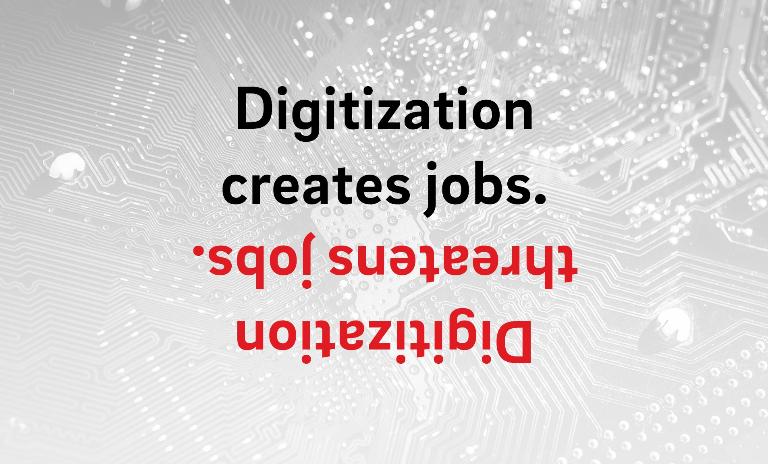" Digitization leads to structural changes in our economy. We must therefore avoid the trap of focusing our attention solely on its net effect on the labor market. "


Future of Work
Digitization is on everyone's lips and we are genuinely experiencing a technological transformation. It is happening in our private world, in the way we communicate and consume things and services. And in our economy, where disruption is the name of the game. Creative entrepreneurs are using digital technologies as a lever. They are revolutionizing business models, redrawing the boundaries between industries and creating new interfaces to the customer. "Creative destruction" is how Schumpeter described this process – and incumbent firms are often its victim.

At first glance, another aspect of the triumphal march of digital technologies appears less revolutionary: the potential of these technologies to drive automation. Aristotle described the consequences way back in ancient times: "[…] if every instrument could accomplish its own work, obeying or anticipating the will of others, like the statues of Daedalus, or the tripods of Hephaestus, which, […] of their own accord entered the assembly of the Gods; if, in like manner, the shuttle would weave […] without a hand to guide it, chief workmen would not want servants, nor masters slaves."
To put that in more provocative terms: Automation destroys labor – which is why the digital revolution could quickly escalate into a social revolution. A glance at the economic and social consequences of ground-breaking innovations such as the steam engine and the mechanical loom suffices to illustrate the point.
We know that simple, manual work processes can be replaced by machines or robots. Today, however, it is no longer merely unskilled labor or workers with few qualifications who are affected. Armed with better sensors, greater connectivity and increasing (albeit still very limited) intelligence, automation is making inroads into what was hitherto the occupational preserve of the better-qualified middle classes.
So are we indeed poised to see the "disruption of labor"? Complete with drastic repercussions for every one of us, for society and for the political realm? Or is this merely an outbreak of Luddite hysteria? Will work become a scarce resource? Are we heading toward a two-tiered society in which the well-educated digital cognoscenti face off with an analogue precariat? Who are the specialists of tomorrow? How will we train them? And how should we manage them?

12 hypotheses
Bottom line
Digitization is coming. But its impact on a broad scale is not coming as fast as some panic-mongers would have us believe. Nor will we see the much vaunted mass unemployment that is supposed to result from the technological transformation. Current debate is still dominated by the terrifying figures published in the Frey/Osbourne study in 2013. Yet the academic community today has a much clearer and more detailed picture of the effects of digitization – a picture that is growing continually brighter. Taking 2014 as its base year, one study produced in 2016 on behalf of Germany's Federal Ministry of Labour and Social Affairs predicted that 250,000 new jobs would be created by 2030. Current employment trends in Germany and the US confirm this trend.
Even so, digitization will, within a single generation, certainly bring lasting change to our world of work. And since this is going to happen, it is all the more important that we now engage in a broad-based and unbiased discussion about the effects of digitization. The aim must be to reach consensus based on which political answers can take shape, companies can plan and individuals can gain a sense of security. Digitization is an opportunity for us all – but only if we do it right. To do so, we need to think about society in new ways and, above all, gain a new understanding of work and labor.

Future of work
![{[downloads[language].preview]}](https://www.rolandberger.com/publications/publication_image/roland_berger_digitization_threatens_jobs_future_of_work_download_preview.jpg)

